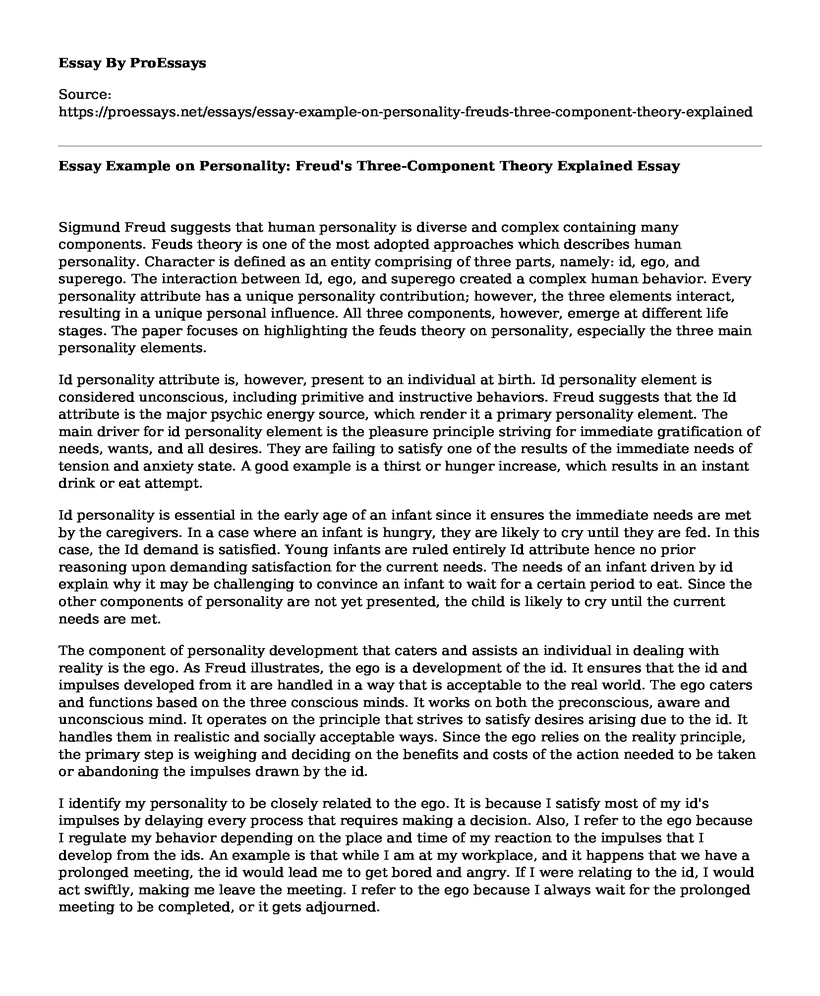Sigmund Freud suggests that human personality is diverse and complex containing many components. Feuds theory is one of the most adopted approaches which describes human personality. Character is defined as an entity comprising of three parts, namely: id, ego, and superego. The interaction between Id, ego, and superego created a complex human behavior. Every personality attribute has a unique personality contribution; however, the three elements interact, resulting in a unique personal influence. All three components, however, emerge at different life stages. The paper focuses on highlighting the feuds theory on personality, especially the three main personality elements.
Id personality attribute is, however, present to an individual at birth. Id personality element is considered unconscious, including primitive and instructive behaviors. Freud suggests that the Id attribute is the major psychic energy source, which render it a primary personality element. The main driver for id personality element is the pleasure principle striving for immediate gratification of needs, wants, and all desires. They are failing to satisfy one of the results of the immediate needs of tension and anxiety state. A good example is a thirst or hunger increase, which results in an instant drink or eat attempt.
Id personality is essential in the early age of an infant since it ensures the immediate needs are met by the caregivers. In a case where an infant is hungry, they are likely to cry until they are fed. In this case, the Id demand is satisfied. Young infants are ruled entirely Id attribute hence no prior reasoning upon demanding satisfaction for the current needs. The needs of an infant driven by id explain why it may be challenging to convince an infant to wait for a certain period to eat. Since the other components of personality are not yet presented, the child is likely to cry until the current needs are met.
The component of personality development that caters and assists an individual in dealing with reality is the ego. As Freud illustrates, the ego is a development of the id. It ensures that the id and impulses developed from it are handled in a way that is acceptable to the real world. The ego caters and functions based on the three conscious minds. It works on both the preconscious, aware and unconscious mind. It operates on the principle that strives to satisfy desires arising due to the id. It handles them in realistic and socially acceptable ways. Since the ego relies on the reality principle, the primary step is weighing and deciding on the benefits and costs of the action needed to be taken or abandoning the impulses drawn by the id.
I identify my personality to be closely related to the ego. It is because I satisfy most of my id's impulses by delaying every process that requires making a decision. Also, I refer to the ego because I regulate my behavior depending on the place and time of my reaction to the impulses that I develop from the ids. An example is that while I am at my workplace, and it happens that we have a prolonged meeting, the id would lead me to get bored and angry. If I were relating to the id, I would act swiftly, making me leave the meeting. I refer to the ego because I always wait for the prolonged meeting to be completed, or it gets adjourned.
Conclusion
The superego is the personality development component that entails almost all our internalized moral standards. It also involves ideas that we acquire from society and those that we learn from our parents. It encompasses the sense of doing right or wrong. It leads an individual to make judgments. As Freud talks about the superego, he describes that its emergence is after age five. He also explains that it can be categorized into two; the ego ideal and the conscience. The ego-ideal entails rules and standards of the behavior that ego requires while conscience deals with information viewed as bad in the society.
Cite this page
Essay Example on Personality: Freud's Three-Component Theory Explained. (2023, Aug 10). Retrieved from https://proessays.net/essays/essay-example-on-personality-freuds-three-component-theory-explained
If you are the original author of this essay and no longer wish to have it published on the ProEssays website, please click below to request its removal:
- Understanding and Controlling Teenage Suicide
- Success Path Exploration in Poetry - Literary Essay Example
- Research Paper on Emotions: Anger vs. Contentment
- Essay on Understanding Mental Health
- Essay Example on Forrest Gump: Mental Illness Portrayed Goofily
- Paper Example on Overcoming Math Anxiety: Cognitive, Affective & Working Memory Models
- Sharpen Your Saw: Research Paper on Principles of Balanced Self-Renewal







